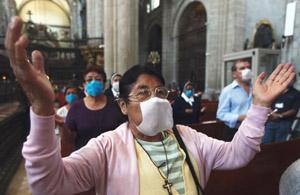
The World Health Organization (WHO) raised the Pandemic Alert Level to Phase 5 on April 29, which means human-to-human spread of the virus has occurred in at least two countries in one WHO region. There also are suspected cases in Iowa, among other states.
A Phase 5 declaration signals that a pandemic is imminent and time is short for finalizing organization, communication and implementation of planned mitigation measures, according to Deacon Frank Agnoli. He is the safety officer for the Diocese of Davenport.
He advises parishes and other entities in the diocese to complete all unfinished tasks from Phases 0-4 in the diocese’s “Policies Relating to Planning for Pandemic Influenza” found on the diocesan Web site: www.davenportdiocese.org/disaster/disasterlibrary/PlanningPandemicInfluenzaUpdate04022008.pdf
Deacon Agnoli also recommends anticipating the changes that might be called for in Phase 6, which signals a pandemic.
“It is possible we will be asking parishes to implement some Phase 6 actions,” Deacon Agnoli said in an e-mail to pastors, parishes and Catholic schools in the diocese.
“We will keep you informed. In the meantime, the following commonsense practices should be kept in mind:
- Sunday obligation: The obligation to attend Mass on Sunday and other Holy Days of Obligation is the ordinary expectation of Catholics. Extraordinary circumstances such as sickness, travel or severe weather excuse the faithful from this obligation. If you are not feeling well, especially during this time of concern, please stay home and do not risk spreading infection to others.
- Sign of Peace: Members of our congregations should not be offended if someone chooses not to shake another person’s hand at the sign of peace. If you are ill, the appropriate response to someone extending a sign of peace might be to bow to them and say, “Peace be with you,” to or wave slightly at the other person.
- Reception of Communion: While the teaching of the Catholic Church that the fullness of the body and blood of Christ are contained in the holy Eucharist, under the form of the host that is distributed at the Mass, the church has also extended the privilege to receive Communion in the form of wine. However, if you are feeling sick, please receive Communion in the hand, and refrain from receiving Communion in the form of wine.
- Persons with comprised immune systems: People who have been directed by their medical advisors that they are particularly susceptible to infection may choose to refrain from any practices by which they might become sick, including shaking hands, receiving holy Communion on the tongue and drinking the precious blood of Christ.
Updates are available on the diocesan Web site at www.davenportdiocese.org/disaster/swineflu.htm







